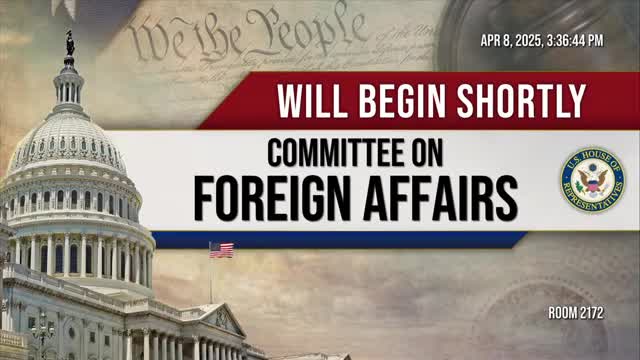House subcommittee questions State Department diversity programs, sparring over national security impact
Get AI-powered insights, summaries, and transcripts
Subscribe
Summary
The House Foreign Affairs Subcommittee on Oversight and Intelligence held a hearing on Oct. 12, 2025, to examine the Department of State’s diversity, equity and inclusion policies and whether they have affected recruitment, promotions and U.S. diplomatic priorities.
The House Foreign Affairs Subcommittee on Oversight and Intelligence held a hearing on Oct. 12, 2025, to examine the Department of State’s diversity, equity and inclusion policies and whether they have affected recruitment, promotions and U.S. diplomatic priorities.
Members sharply disagreed over whether DEI initiatives diverted resources from core diplomatic missions or improved the department’s effectiveness. Republican members and two witnesses argued DEI programs had been used to influence hiring, promotion and overseas programming in ways that undermined merit and national security. Democrats and Ambassador Gina Abercrombie Winstanley, who served as the department’s chief diversity and inclusion officer, defended the programs as transparency and recruitment reforms intended to strengthen the Foreign Service.
The dispute centered on three lines of argument: (1) budget and spending tied to DEI programming, (2) personnel processes such as recruitment and promotion, and (3) whether DEI work was exported abroad in ways that could damage U.S. interests.
Witnesses presenting critical accounts included Simon Hankinson, identified as a senior research fellow at the Heritage Foundation, who argued that DEI policies “rigged the system to provide results that they want as opposed to just judge people according to their abilities and, and merits.” He said changes to hiring and oral assessment processes had increased the share of candidates passing and altered recruitment standards, an effect he described as reducing “diversity of viewpoint.”
James Rogers, senior counsel at America First Legal and a former State Department foreign service officer, recounted workplace grievances and alleged misuse of DEI metrics. Rogers testified that “the department started assigning diversity, equity, inclusion, and accessibility scores to employees in 2022 and using them to make tenure and promotion decisions.” He also described a personal whistleblower case and said Freedom of Information Act requests uncovered cables that, in his view, showed ideological bias in some programs.
Ambassador Gina Abercrombie Winstanley, who led the department’s Office of Diversity and Inclusion, disputed claims that DEI hires or unlawful practices took place. She said reforms aimed to reduce cronyism and increase transparency in assignments and promotion panels. On funding she stated, “At the beginning, my first year, our budget was about $2,200,000. By the time I left, it had grown to about $7,000,000,” and she described the office’s work as management improvements intended to retain talent and protect taxpayer investment in training and overseas postings.
Members pressed witnesses on whether DEI programs improved diplomatic outcomes. Hankinson said he saw no metrics proving improved security or diplomatic effectiveness. Rogers argued that promoting contested social programs overseas risked creating resentment and undermining U.S. goals. Abercrombie Winstanley answered that reflecting America’s diversity “brings us credibility as a nation” and helps diplomats connect with foreign publics; she added that “every change we made, every effort we undertook, every data point we gathered was cleared by our lawyers.”
Several members criticized the hearing’s focus. Ranking Member Representative Jared Moskowitz (D-Fla.) and Representative Madeleine Dean (D-Pa.) described the session as backward-looking and urged attention to current foreign policy crises. Chairman Mills (R-Fla.) countered that understanding past policies was needed to guide reforms and said the committee would continue oversight work.
No formal votes or committee directives were recorded at the hearing. Members were given the opportunity to submit additional questions for the record.
The hearing produced competing proposals for oversight: Republican members and witnesses urged tighter budget oversight and changes to recruitment and promotion processes to remove what they described as DEI scoring and hidden criteria; Democratic members and Ambassador Abercrombie Winstanley emphasized transparency, open competition for assignments and retention of talented personnel. The committee signaled follow-up written questions and additional oversight as next steps.
The transcript of the hearing is being entered into the record and members may submit questions for the witnesses within five days under committee rules.
